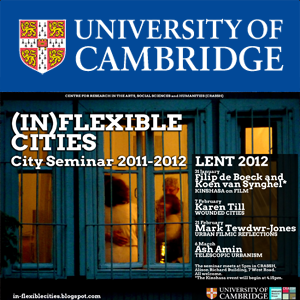City Seminar - 11 February 2014 - Performance, Power and Place of the Hustle Economy in Nairobi, Kenya
Duration: 56 mins 18 secs
Share this media item:
Embed this media item:
Embed this media item:
About this item

| Description: |
Tatiana Thieme (University of Cambridge)
Abstract Conceptualizations of small-scale, self-employed work in low-income urban economies tend to offer apolitical, individualistic notions of entrepreneurship and focus especially on the enabling factors for (albeit frugal) innovation. The talk will offer an alternative interpretation of self-employed work amongst the urban poor by examining the narratives of youth living in Nairobi slums whose everyday social and economic practices are associated with “hustling.” In this talk, three particular scenarios in which “hustling” takes place will be examined: Youth in the largest slum of East Africa, Kibera, who become the spokespeople for the urban poor to international NGOs and development donors and refer to NGO workshops as “feeding programs” where a free lunch and day’s wage is given in exchange for attendance and “participation”; Youth in Huruma who establish opportunistic alliances with their constituency’s MP, serving as grassroots political campaigners in exchange for one-off hardware ‘gifts’ such as water tanks or public toilets to manage and use for income generation activities; and youth across the city’s slum communities engaged in Taka ni pato (trash is cash) work responding critically to the absence of municipal basic services and lack of employment opportunities through the under-utilized resource of waste. Mapping across these three kinds of “hustle” is the tenuous boundary between licit and illicit work, stigmas associated with urban poverty and youth simultaneously, and temptations to engage in opportunistic crime. |
|---|
| Created: | 2014-02-27 09:49 |
|---|---|
| Collection: | City Seminar |
| Publisher: | University of Cambridge |
| Copyright: | Glenn Jobson |
| Language: | eng (English) |
| Distribution: |
World
|
| Keywords: | CRASSH; City Seminar; |
| Explicit content: | No |
| Abstract: | Tatiana Thieme (University of Cambridge)
Abstract Conceptualizations of small-scale, self-employed work in low-income urban economies tend to offer apolitical, individualistic notions of entrepreneurship and focus especially on the enabling factors for (albeit frugal) innovation. The talk will offer an alternative interpretation of self-employed work amongst the urban poor by examining the narratives of youth living in Nairobi slums whose everyday social and economic practices are associated with “hustling.” In this talk, three particular scenarios in which “hustling” takes place will be examined: Youth in the largest slum of East Africa, Kibera, who become the spokespeople for the urban poor to international NGOs and development donors and refer to NGO workshops as “feeding programs” where a free lunch and day’s wage is given in exchange for attendance and “participation”; Youth in Huruma who establish opportunistic alliances with their constituency’s MP, serving as grassroots political campaigners in exchange for one-off hardware ‘gifts’ such as water tanks or public toilets to manage and use for income generation activities; and youth across the city’s slum communities engaged in Taka ni pato (trash is cash) work responding critically to the absence of municipal basic services and lack of employment opportunities through the under-utilized resource of waste. Mapping across these three kinds of “hustle” is the tenuous boundary between licit and illicit work, stigmas associated with urban poverty and youth simultaneously, and temptations to engage in opportunistic crime. |
|---|---|

